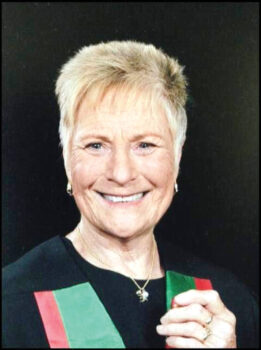 Robert (Bob) Jackson
Robert (Bob) Jackson
Gays, Lesbians and Allies at SaddleBrooke (GLAAS) board member, Bonnie Buntain, MS, DVM, presented a seminar entitled “Global Conditions Contributing to Emerging Zoonotic Pandemics including COVID-19” at a special members-only Zoom event on July 10. Bonnie is a world-class authority in this topic. She holds a Doctorate of Veterinary Medicine and is a Diplomate (Emerita) of the American Board of Veterinary Practitioners (Equine Specialty), and a Diplomate of the American College of Veterinary Preventive Medicine. She is a Professor Emerita in Public Health and Food Safety at the University of Calgary, Canada, and a Fellow at Aberystwyth University, Wales. Professor Buntain has continued to work after moving to SaddleBrooke as an Appointed Professor in the College of Veterinary Medicine in the Office of the Dean at the University of Arizona.
The discussion provided an overview on the reasons certain infectious diseases originating from animals (zoonotic) are emerging and spreading globally. These human pathogens include COVID-19, SARS, MERS, Ebola, Zika, Swine influenza, West Nile Virus, and HIV, among others. Members learned why the health of humans, animals, and the environments (ecosystems) we share are so closely linked. In addition, the concept of “spillover” was introduced to help explain how this has resulted in global pandemics. Bonnie also discussed other root causes to the emergence of pandemics, including global travel, poverty, displaced peoples and animals from wars and famine, wildlife trade, cultural practices such as eating wildlife, disrupted environments and climate change, and microbial adaptation to different hosts.
Bonnie also described what “contact tracing” is and used the 2016 PBS documentary “Spillover” as an example and how the concept of spillover plays a critical role in understanding and thus preventing further disease spread. This documentary, first aired in 2016, predicted our current situation with COVID-19 disease.
Bonnie introduced the concept of the “One Health Approach” and how it is a valuable tool to better prevent, respond and control these global health challenges. It embraces the idea that complex problems at the human-animal-environmental interface can best be solved through multidisciplinary communication, cooperation, and collaboration and engagement of community knowledge. Currently there is a bill, “Advancing Emergency Preparedness Through One Health Act,” in Congress that would strengthen federal agency coordination.
If you are interested in more information, Dr. Buntain provided these resources: “Profile of a Killer Virus” by David Cyranoski from Nature, Vol. 581, 7 May 2020, pages 22-26 at www.nature.com/articles/d41586-020-01315-7; the 2016 documentary found on PBS entitled “Spillover” at www.pbs.org/spillover-zika-ebola-beyond/home and the CDC One Health Office at www.cdc.gov/onehealth/pdfs/OneHealth-FactSheet-FINAL.pdf.
The mission of GLAAS is to “use the power of community and camaraderie to celebrate the lives of lesbian, gay, bisexual, transgender and straight people.” The GLAAS board is looking for ways to get together, maybe virtually or in small groups with appropriate social distancing. If you have an idea and are willing to spearhead the project, let us know about it by sending an email to glaasclub@gmail.com.
